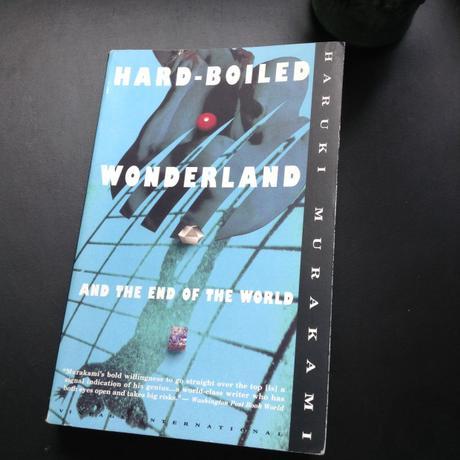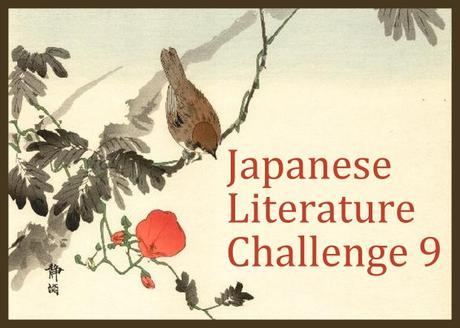
"Well, it's like this. Deep in your consciousness there's this core that is imperceptible to yourself. In my case, the core is a town. A town with a river flowing through it and a high brick wall surrounding it. None of the people in the town can leave. Only unicorns can go in and out. The unicorn absorbs the egos of the townpeople like blotter paper and carry them outside the wall. So the people in the town have no ego, no self. I live in the town - or so the story goes. I don't know any more than that, since I haven't actually seen any of this with my own eyes." (p. 359)
And that, from the first person point of view of our narrator, is about as succinct a description of this bizarre book as I can record. Bizarre, but of course wonderful at same time.
When the novel opens we are in an elevator, an elevator as big as an office, which travels so smoothly it is hard to tell if it is moving at all. It opens to reveal a chubby, lovely seventeen year old girl dressed entirely in pink, who takes him to a dark abyss into which he must jump in order to meet an old man in "a secret laboratory behind a subterranean waterfall just to escape inquisitive eyes."
The old man is the girl's grandfather, a biologist who says he is researching the mammalian palate. Apparently he has hired our nameless narrator, later called a Dreamreader, to launder and shuffle numbers by converting them in his brain.
Two entities are at war with each other over data; one is the Calcutecs who protect information, the other is the Semiotecs who steal information. Here, in part, lies the hard-boiled detective stuff, for when our narrator is given a skull from the old man as a present, it is the Semiotecs who break into his apartment to steal it. Apparently, this skull has value for reasons not entirely clear to us. (Only later do we discover that this is where the minds are kept.)
Alternating chapters with the grandfather, dark slimy tunnels, a seventeen year old girl and our narrator, are parallel chapters in which he dwells in the Town. The Town has a Wall, and a River, a Gatekeeper and a Pond. But, it doesn't have anyone's shadow. Those who dwell in the town must be severed from their shadows, which are sent to exile. "As the Gatekeeper warned you," the old officer continues, "one of the conditions of this Town is that you cannot possess a shadow. Another is that you cannot leave. Not as long as the Wall surrounds the Town."
The Town resembles Stepford to me, or the land where It dwells in A Wrinkle in Time. It does next seem that its inhabitants (such as the Colonel, the Gatekeeper, the Librarian) are allowed personal choice, or freedom to be themselves. In fact, it seems as if they have been robbed of emotions which make life less than orderly. The Librarian, in fact, is unfulfilled. No matter how much she consumes for dinner, she is never satiated. She claims it is because she has a gastric disorder, but I think the emptiness reflects her heart, rather than her stomach.
Our narrator's shadow tells him:
"Just now, you spoke of the Town's perfections. Sure, the people here-the Gatekeeper aside-don't hurt anyone. No one hurts each other, no one has wants. All are contented and at peace. Why is that? It's because they have no mind."
"That much I know too well," I say.
"It is by relinquishing their mind that the Townfolk lose time; their awareness becomes a clean slate of eternity. As I said, no one grows old or dies. All that's required is that you strip away the shadow that is the grounding of the self and watch it die. Once your shadow dies, you haven't a problem in the world. You need only to skim off the discharges of the mind that rise each day."
We read this novel to look at parallel universes which Haruki Murakami presents to us. We read it to dwell in the fantastic, and finally, to ponder the mystery of it all. The Hard-boiled Wonderland and the End of The World won the Tanizaki Prize in 1985. Part science fiction, part fantasy, part "hard-boiled" detective (influenced by Murakami's admiration for Raymond Chandler), this novel is all Murakami.
Some favorite quotes from this book:They who never wanted family are now lonely old men.
Maybe no one finds it, or even misses it, but fairness is like love. What is given has nothing to do with what we seek.
~o0o~
With this novel begins the Japanese Literature Challenge 9. It runs from June, 2015 through January, 2016, and for the challenge you "must" read only one piece of Japanese literature. I have listed the people who indicated interest, or said they would jump in with both feet, below the button. I hope that anyone else who desires to read Japanese literature will join us in our discoveries. How excited I am to begin! Welcome! Please find the review site here.

Participants:
Gary at Pomes All Sizes
MarinaSofia at findingtimetowrite
Carol at Brilliant Years
Jacqui at Jacqui Wine's Journal
Sakura at Chasing Bawa
Claire at Word by Word
TJ at My Book Strings
Jackie at Farmlane Books
JoV at JoV's Book Pyramid
Suko at Suko's Notebook
Iliana at Bookgirl's Nightstand
Nadia at A Bookish Way of Life
Kelly at Orange Pekoe Reviews
Ally at Snow Feathers
Terri at Terri Talks Books
Rare Bird at a murder of crows
Cathy at 746 Books
Akylina at The Literary Sisters
Edgar at Simple Images 2
Brona at Brona's Books
Bellezza at Dolce Bellezza

